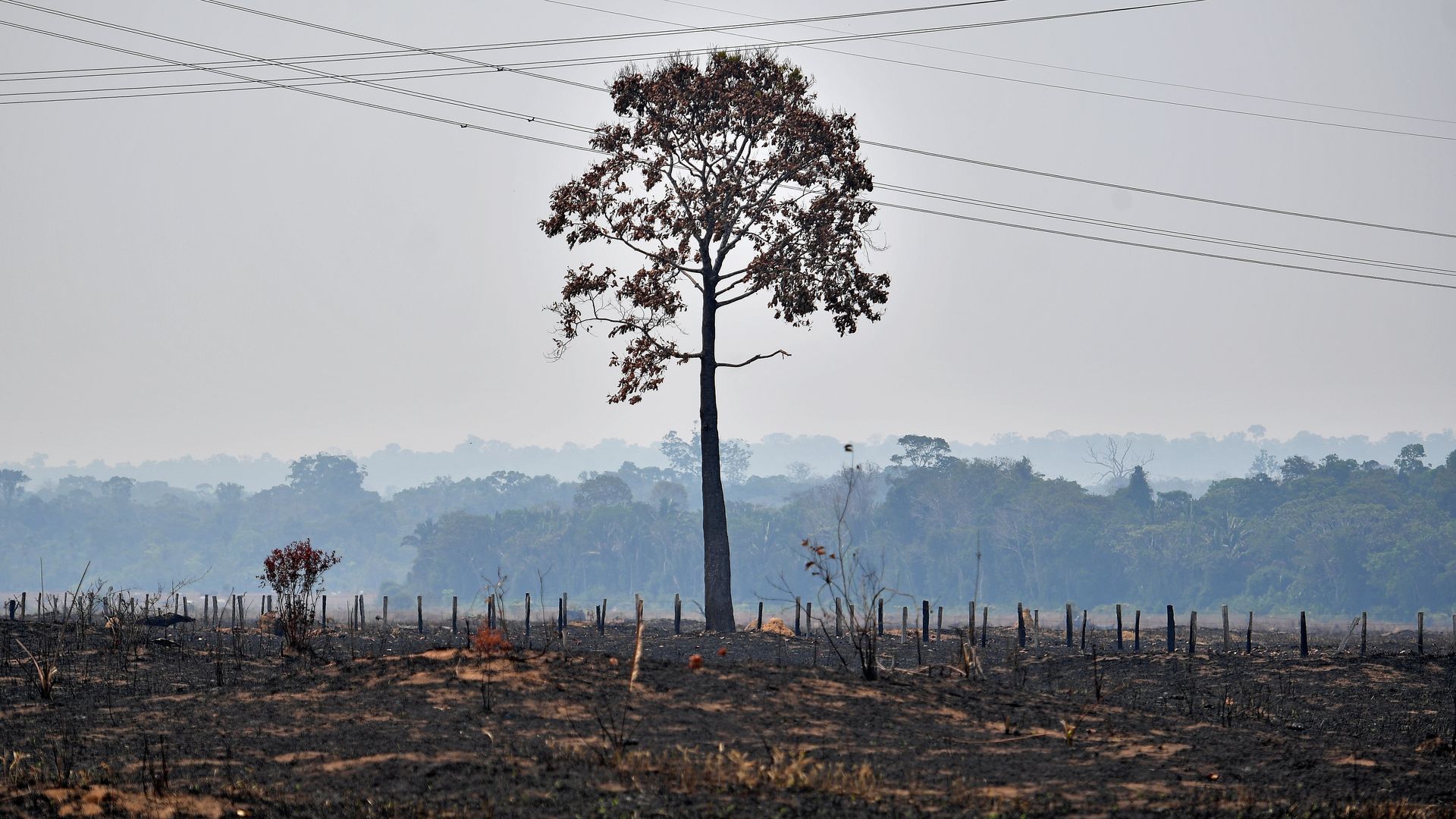Paving Amazon highway could cause irreversible damage, researchers warn
Add Axios as your preferred source to
see more of our stories on Google.

Lone burnt tree stands in a deforested area near Porto Velho, Rondônia State, in Brazil's Amazon basin in 2019. Photo: Carl De Souza/AFP via Getty Images
Paving a Brazilian highway that runs through the Amazon without environmental studies could lead to massive deforestation and release of carbon dioxide into the atmosphere, two scientists warn in a letter published in Science Thursday.
State of play: Brazil's administration is facing a rampant COVID-19 pandemic, the probability of its worst recession ever and criminal investigations. Estimates of soaring illegal deforestation has led to a global backlash over not protecting the Amazon.
The backstory: The BR-319, sometimes called "Brazil's worst highway," is a 800 km mostly dirt road from Porto Velho through the Amazon forest to the city of Manaus in the middle.
- The letter says it traverses 63 official Indigenous areas plus five other areas containing Indigenous communities.
- The highway was built by the military in 1973 but mostly abandoned in 1988 and is difficult to navigate as less than one-third is paved now. It's been the subject of dispute for decades.
- While a judicial decision had previously ruled that environmental studies must be carried out before paving the highway, President Jair Bolsonero has started moving forward, according to co-author Lucas Ferrante, a post-graduate student at the National Institute for Research in Amazonia (INPA).
Why it matters: These moves will "likely accelerate anthropogenic climate change" and negatively impact Indigenous communities, per the letter, which was co-authored by Philip Martin Fearnside, professor in the Department of Environmental Dynamics at INPA.
- Planned reconstruction includes many secondary roads, including some the authors consider "illegal," which together are projected to lead to more than 138,000 square kilometers of deforestation by 2100 — an increase of cumulative deforestation of 1,291%, when compared with the area cleared by 2011, Ferrante says.
- “The historical process of opening roads in the Amazon is marked by intense social conflicts involving squatters, farmers, ranchers, rubber tappers and Indigenous people. If these Indigenous peoples are not consulted about the highway, there is a chance that we will see a genocide here,” Ferrante tells Axios. Already, concerns have risen over exposing Indigenous communities to the coronavirus.
What they're saying: John Miller, a carbon scientist at NOAA Global Monitoring Laboratory, says the letter describing the situation is "concerning" and the overall point is true.
- But he adds further data should be presented behind some of the "grand statements that are not necessarily supported," such as the 1,291% increase from 2011.
"The Amazon holds a lot of carbon both in its trees and in the soil. If you go through processes of deforestation, two things happen."
"One is that the carbon that is locked away and stored in those trees that the ecosystems have been sucking in ... that sometimes literally goes up in smoke. Or, it either decomposes slowly or goes up in a fire. But it returns to the atmosphere as carbon dioxide. And, that's certainly not what we need now when we have so much carbon dioxide already coming out of power plants and cars, etc."
"The other thing that happens when you denude a forest is that you lose the future capability for the forest to absorb carbon. So there's really two simultaneous effects that you have through deforestation. And, that's the spirit of their statement."— John Miller
What's next: Ferrante says they hope to accomplish three steps:
- Cancel the paving bidding and suspend maintenance.
- Carry out environmental studies requiring an external opinion to avoid approval by pressure from the government.
- Ensure consultation of the 68 indigenous areas impacted by the highway, as established by ILO Convention 169.
Go deeper:
